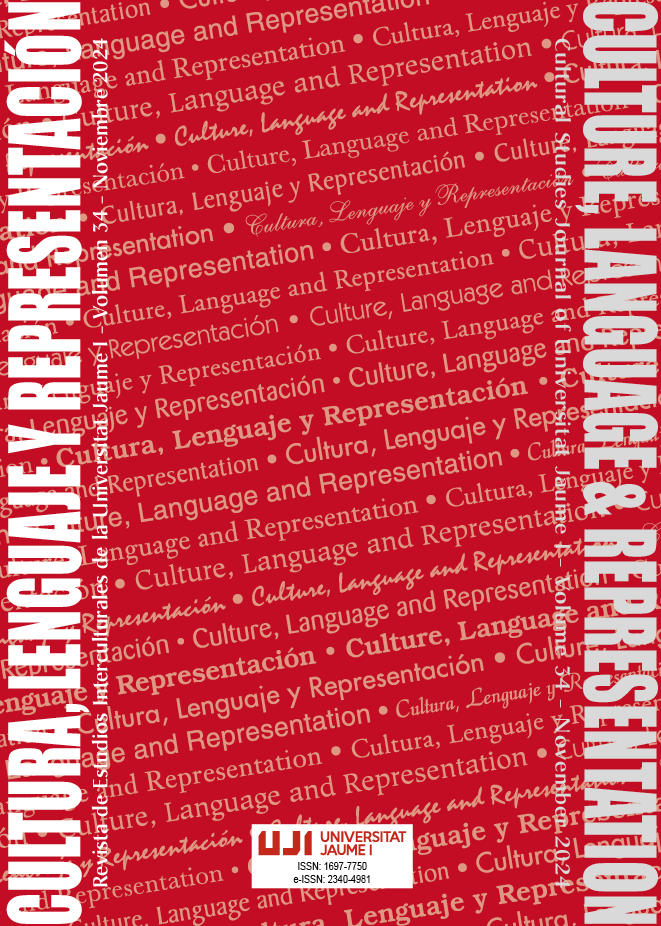Denominative variation in the terminological representation of Women's Health
Main Article Content
Abstract
Medical language is characterized by its veracity, precision and clarity (Navarro, 2003). However, due to the different communicative situations and contexts in which it is used, it is one of the special languages with more terminological variation (Bowker and Hawkins, 2006). From the point of view of terminology work, in any of its applications: language planning, standardization or translation, the first steps consist of structuring the subject area and accurately define the conceptual field (Cabré, 2005; ISO, 2022; Wright, 1997), and variation is usually an obstacle during this stage. This paper presents the findings of a study for the elaboration of terminological resources on Women’s Health from a corpus of specialized academic articles in English. Preliminary results reveal a lack of uniformity in the identification of the most representative lexical units regarding issues that specifically affect Women’s Health. This analysis offers a typology of denominative variation in the subject field of Women’s Health in academic journals in English prior to initiate the delimitation of the conceptual field in Spanish and standardize terminology equivalence in order to ensure efficient communication.
Downloads
Article Details

This work is licensed under a Creative Commons Attribution-ShareAlike 4.0 International License.
An open-access CREATIVE COMMONS copyright license is used. Those authors whose works are published by this journal, accept the following terms:
- Authors will retain their copyright and guarantee the Journal the right to first publish their work, which will simultaneously be subject to the Creative Commons Recognition License CC BY SA that allows third parties to share the work, provided that its author and first publication is indicated.
- Authors may adopt other non-exclusive license agreements for the distribution of the published version of the work (e.g., deposit it in an institutional telematics file or publish it in a monographic volume) provided that the initial publication in this journal is indicated.
- Authors are allowed and recommended to disseminate their work over the Internet (e.g. in institutional telematics files or on their website) before and during the submission process, which can produce interesting exchanges and increase quotes of the published work.
Funding data
-
Ministerio de Ciencia e Innovación
Grant numbers TED2021-130040B-C21
References
Auger, Pierre and Rousseau, Louis-Jean (1987). Metodologia de la recerca terminológica. (M.T. Cabré, Trad.). Departament de Cultura de la Generalitat de Catalunya.
Alarcón-Navío, Esperanza, López-Rodríguez, Clara Inés, and Tercedor-Sánchez, Maribel. (2016). Variation dénominative et familiarité en tant que source d’incertitude en traduction médicale. Meta, 61(1), 117-144. https://doi.org/10.7202/1036986ar
Alcaraz, Enrique (2000). El inglés profesional y académico. Alianza Editorial.
Arntz, Reiner and Picht, Heribert (1995). Introducción a la terminología. (A. de Irazazábal, M. J. Jiménez, E. Schwarz, y S. Yunquera, Trads.). Pirámide.
Bowker, Lynne, and Hawkins, Shane (2006). Variation in the organization of medical terms: Exploring some motivations for term choice. Terminology, 12, 79-110. https://doi.org/10.1075/term.12.1.05bow
Cabré, Teresa (1993). La terminología. Teoría, metodología, aplicaciones. (C. Tebé, Trad.). Antàrtida/Empúries.
Daille, Béatrice, Habert, Benoît, Jacquemin, Christian, and Royauté, Jean. (1996). Empirical observation of term variations and principles for their description. Terminology. International Journal of Theoretical and Applied Issues in Specialized Communication, 3(2), 197-257. https://doi.org/10.1075/term.3.2.02dai
Dubuc, Robert y Lauriston, Andy (1997). Terms and Contexts. In S. E. Wright and G. Budin (Eds.), Handbook of Terminology Management. (pp. 80-88) John Benjamins Publishing.
Freixa, Judit, and Montané March, M. Amor (2006). Variación denominativa y biunivocidad en el lenguaje de las matemáticas. Revista española de lingüística. 36: 189-215.
Freixa, Judit (2006). Causes of denominative variation in terminology: A typology proposal. Terminology, 12(1), 51 – 77. https://doi.org/10.1075/term.12.1.04fre
International Organization for Standardization. (2022). Terminology work — Principles and methods (ISO 704).
Lerat, Pierre (1997). Las lenguas especializadas. Ariel.
Navarro, Fernando (2009). La precisión del lenguaje en la redacción médica. Quaderns de la Fundació Dr. Antoni Esteve, 89-104.
Peters, Pam, Qian, Yan, and Ding, Jun. (2018). Translating medical terminology and bilingual terminography. Lexicography, 3(2), 99–113. https://doi.org/10.1007/s40607-018-0037-y
Picht, Heribert (1987). Terms and their LSP environment-LSP Phraseology. Meta, 32, 2, 149-155. https://doi.org/10.7202/003836ar
Resche, Catherine (2000). An Approach to Interface Terminology: The Example of Environmental Economics in English as a Foreign Language. Meta XLV 4, 628:645. https://doi.org/10.7202/003941ar
Sager, Juan Carlos (1990). A Practical Course in Terminology Processing. John Benjamins Publishing.
Tercedor-Sánchez, Maribel (2011). The cognitive dynamics of terminological variation. Terminology. 17(2), 181-197. https://doi.org/10.1075/term.17.2.01ter
TERMCAT. (1990). Metodologia del treball terminològic. Generalitat de Catalunya.
Wiese, Ingrid. (2018). Terminology Work in Different Domains: Medical Terminology. In John Humbley, Gerhard Budin, and Christer Laurén (Eds.), Languages for Special Purposes (pp. 522-534). De Gruyter Mouton. https://doi.org/10.1515/9783110228014-027
Wright, Sue Ellen (1997). Term selection: The initial phase of Terminology Management. In Sue Ellen Wright, and Gerard Budin. (Eds.), Handbook of terminology management. (pp. 13-24). John Benjamins Publishing.
Wright, Sue Ellen and Wright, Leland. (1997). Descriptive Terminology: Terminology Management for Technical Translation. In Sue Ellen Wright, and Gerard Budin. (Eds.), Handbook of terminology management (147-159). John Benjamins Publishing.
Wüster, Eugene (1998). Introducción a la teoría general de la terminología y a la lexicografía terminológica. Universidad Pompeu Fabra.


